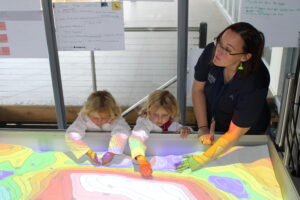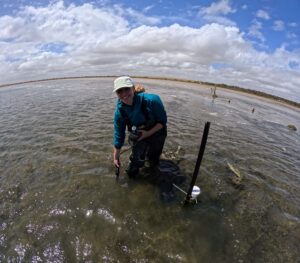
The Goyder Institute for Water Research is pleased to announce that it is partnering with the Australian and South Australian governments for Phase 1 of the Healthy Coorong Healthy Basin Program (HCHB). This follows the establishment of the Institute’s third term, with its role to identify, develop and adopt knowledge for complex water management issues. The Institute’s involvement in HCHB will build on its achievements to-date and ensure that it continues to provide the knowledge to inform the priority water policies of South Australia.
The Coorong is culturally, environmentally and economically important at local, national and international scales but has experienced a long-term decline in its ecological condition due to reductions in inflows. Whilst there has been recovery of some elements of the Coorong ecosystem associated with increased inflows since the Millennium Drought and recovery activities undertaken in the Coorong, the South Lagoon has not recovered to the levels expected. The change in ecological condition has been observed for a number of indicators. Most notably this has included large reductions in the abundances of some waterbirds, with the Coorong considered one of the most important refuge site for waterbird populations in the Murray-Darling Basin. However, like many migratory wader species, population declines are also a result of impacts along their flyways. There has also been a switch of the ecosystem from being dominated by aquatic plants to algae. Excessive algal growth is limiting the resilience of the keystone aquatic plant Ruppia tuberosa. This has had further impacts for the Coorong as Ruppia helps to maintain water quality, provides habitat for invertebrates and fish, and provides food for waterbirds.
These changes in the ecosystem and the limited recovery is likely caused by a number of complex, interacting factors, which are not well understood. This is limiting the capacity of researchers to forecast the ecological response to future management scenarios and therefore the capacity of water managers to identify management interventions required to improve the health of the Coorong. To address this, the Institute partners have been working closely with the South Australian Department for Environment and Water (DEW) to scope the knowledge needed to identify the factors that are limiting the recovery of the South Lagoon ecosystem and the management interventions required to improve its health.
The Institute’s research program will consist of a series of integrated projects that collectively provide knowledge to inform the future management of the system. Each project will bring together experts in multi-disciplinary and collaborative teams from CSIRO, Flinders University, the University of Adelaide, the University of South Australia and SARDI. The teams will investigate:
- the drivers and sources of undesirable nutrient cycles, which are affecting water and sediment quality in the Coorong. When combined with particular water and salinity levels, excessive nutrients levels can promote ‘black ooze’ sediments, and algal blooms which reduce the quality of Coorong habitats for invertebrates, plants, fish and waterbirds. The team will assess the nutrient dynamics of the Coorong and the interaction with other drivers to determine how existing and new interventions can be used to manage nutrient levels.
- how filamentous algae and aquatic plants respond to temperature, water quality changes and different sediment types. This will build on the work of the nutrient dynamics project, with the team investigating how aquatic plant survival and recruitment respond to system-scale environmental changes (e.g. flow conditions, water levels, nutrients and salinity). This information will be used to develop a restoration strategy for aquatic plants (including the keystone species: Ruppia) with consideration of the complex interactions between the factors controlling its resilience.
- what combination of factors result in the food resources that are required to support a productive and resilient Coorong food web. The team will investigate the primary food sources and their relative importance for key fish and waterbird species, how it is influenced by key environmental factors and how it will respond to future management scenarios.
- how key waterbird species respond to changes in habitat in the Coorong and surrounding wetlands. The team will combine information regarding food resources (see above) with measures of habitat quality established during the project. This information will be used to develop models to assess how key waterbird species will respond to different management interventions.
- how the ecology of the Coorong could respond to climate change and options to adapt management to maintain a healthy ecosystem. The team will draw on the knowledge, expertise and experience of local stakeholders, wetland experts, managers, policymakers and climate adaptation experts. This information will be used in the development of a Climate Adaptation Plan for the Coorong.
The research will build on earlier projects of the CLLMM Recovery Project and the Goyder Institute, including Recommended actions for restoring the ecological character of the South Lagoon of the Coorong and Urgent investigations for restoring the ecological character of the South Lagoon of the Coorong. The findings of the research will be used to inform the selection of potential infrastructure solutions to improve the health of the Coorong’s South Lagoon based on scientific evidence and independent expert advice.
Contact Dr Kane Aldridge, Goyder Institute for Water Research, for more information about the Institute’s research program or read more about Healthy Coorong Healthy Basin.
This project is part of the Department for Environment and Water’s Healthy Coorong, Healthy Basin Program, which is jointly funded by the Australian and South Australian governments.



